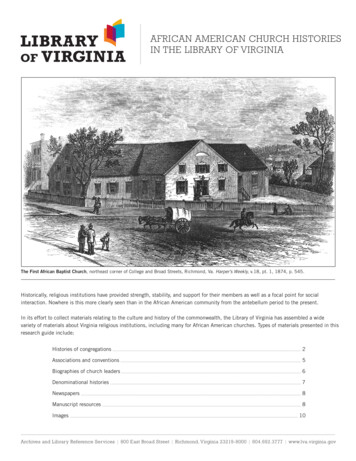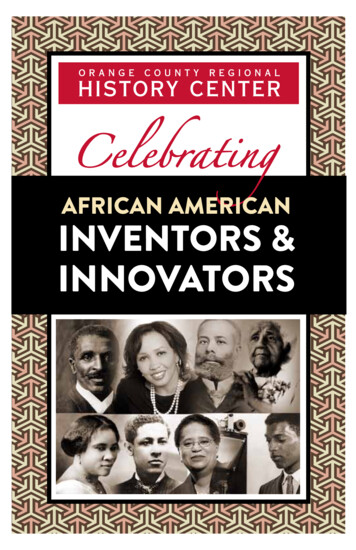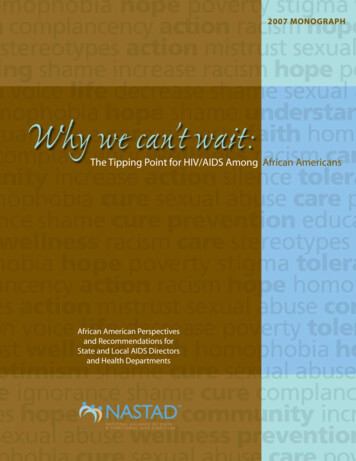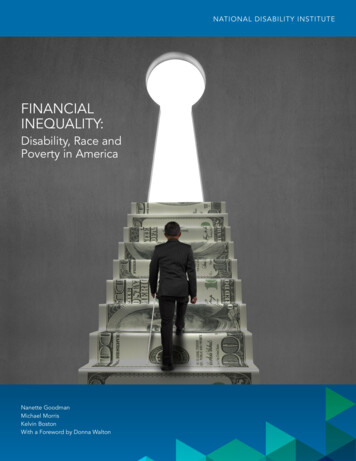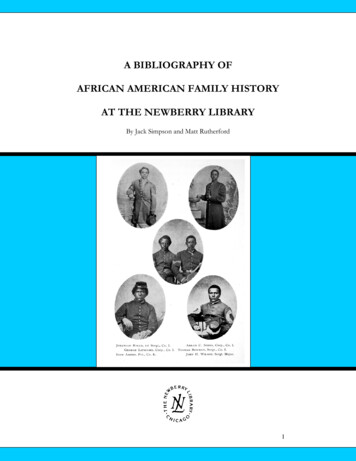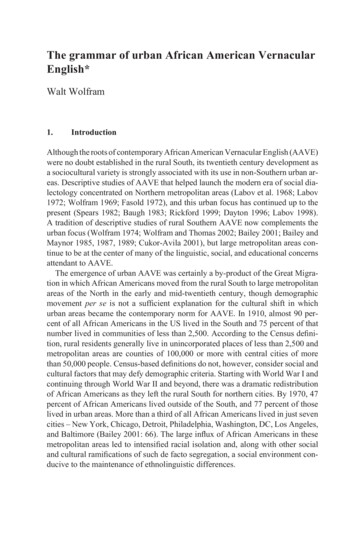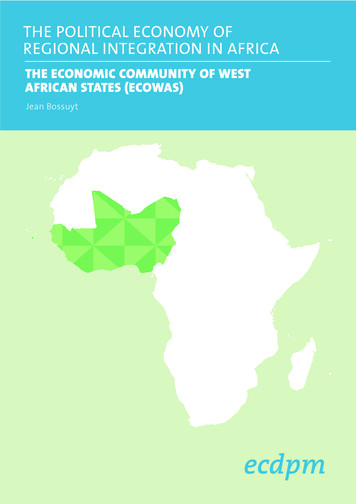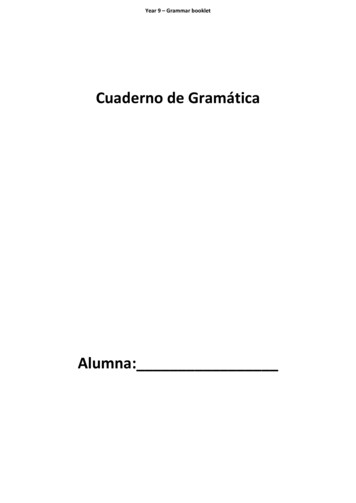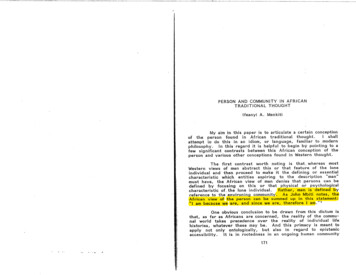
Transcription
PERSON AND COMMUNITY IN AFRICA NTRADITIONAL THOUGH TIfeanyi A . Menkit iMy aim in this paper is to articulate a certain conceptio nI shal lof the person found in African traditional thought .attempt do this in an idiom, or language, familiar to moder nphilosophy . In this regard it is helpful to begin by pointing to afew significant contrasts between this African conception of th eperson and various other conceptions found in Western thought .The first contrast worth noting is that, whereas mos tWestern views of man abstract this or that feature of the lon eindividual and then proceed to make it the defining or essentia lcharacteristic which entities aspiring to the description " man "must have, the African view of man denies that persons can b edefined by focusing on this or that physical or psychologica lcharacteristic of . the lone individual . Rather, man is defined b yreference to the environing community . As John Mbiti notes, th eAfrican view of the person can be summed up in this statement :" I am because we are, and since we are, therefore I am . " 'One obvious conclusion to be drawn from this dictum i sthat, as far as Africans are concerned, the reality of the communal world takes precedence over the reality of individual lif ehistories, whatever these may be . And this primacy is meant t oapply not only ontologically, but also in regard to epistemi caccessibility . It is in rootedness in an ongoing human communit y1 71
IFEANYI A . MENKITIPerson and Community in African Traditional Thoughtthat the individual comes to see himself as man, and it is by firs tknowing this community as a stubborn perduring fact of th epsychophysical world that the individual also comes to kno whimself as a durable, more or less permanent, fact of this world .In the language of certain familiar Western disciplines, we coul dsay that not only the biological set through which the individua lis capable of identification by reference to a communal gene pool ,but also the language which he speaks and which is no smal lfactor in the constitution of his mental dispositions and attitudes ,belong to this or that specific human group . What is more, th esense of self-identity which the individual comes to posses scannot be made sense of except by reference to these collectiv efacts . And thus, just as the navel points men to umbilical linkage with generations preceding them, so also does language an dits associated social rules point them to a mental commonwealt hwith others whose life histories encompass the past, present, an dfuture .A crucial distinction thus exists between the Africa nview of man and the view of man found in Western thought : i nthe African view it is the . community which defines the person a sperson, not some isolated static quality of rationality, will, o rmemory .This brings us to the second point of contrast betwee nthe two views of man, namely, the processual nature of being i nAfrican thought--the fact that persons become persons only afte ra process of incorporation . Without incorporation into this o rthat community, individuals are considered to be mere danglers t owhom the description ' person ' does not fully apply . For personhood is something which has to be achieved, and is not give nsimply because one is born of human seed . This is perhaps th eburden of the distinction which Placide Tempels' native informant ssaw fit to emphasize to him--i .e . the distinction between a munt umutupu (a man of middling importance) and muntu muku/umpe ( apowerful man, a man with a great deal of force) . Because th eword " muntu" includes an idea of excellence, of plenitude of forc eat maturation, the expression ' ke muntu po ' , which translates a s' this is not a man', 2 may be used in reference to a human being .Thus, it is not enough to have before us the biological organism ,with whatever rudimentary psychological characteristics are see nas attaching to it . We must also conceive of this organism a sgoing through a long process of social and ritual transformatio nuntil it attains the full complement of excellencies seen as trul ydefinitive of man . And during this long process of attainment ,the community plays a vital role as catalyst and as prescriber o fnorms .1 72In light of the above observations I think it would b eaccurate to say that whereas Western conceptions of man go fo rwhat might be described as a minimal definition of the person--whoever has soul, or rationality, or will, or memory, is seen a sentitled to the description ' person ' --the African view reache sinstead for what might be described as a maximal definition of th eperson . As far as African societies are concerned, personhood i ssomething at which individuals could fail, at which they could b ecompetent or ineffective, better or worse . Hence, the Africa nemphasized the rituals of incorporation and the overarchin gnecessity of learning the social rules by which the communit ylives, so that what was initially biologically given can come t oattain social self-hood, i . e . , become a person with all the inbuil texcellencies implied by the term .That full personhood is not perceived as simply given a tthe very beginning of one ' s life, but is attained after one is wel lalong in society, indicates straight away that the older an individual gets the more of a person he becomes . As an Igbo proverb has it, " What an old man sees sitting down, a young ma ncannot see standing up . " The proverb applies, it' must be added ,not just to the incremental growth of wisdom as one ages ; it als oapplies to the ingathering of the other excellencies considered t obe definitive of full personhood . What we have here then is bot ha claim that a qualitative difference exists between old an dyoung, and a claim that some sort of ontological progressio nexists between infancy and ripening old age . Ohe does not jus ttake on additional features, one also undergoes fundamenta lchanges at the very core of one's being .Now, admittedly, the whole idea of ontological progression is something in need of elaboration . Offhand it may not sitvery well in the minds of those unaccustomed to the view o fpersonhood being presented here . The temptation might b estrong in some quarters to retort that either an entity is aperson or it is not ; that there can be no two ways about it . I nresponse to this misgiving let me note that the notion of a nacquisition of personhood is supported by the natural tendency i nmany languages, English included, of referring : to children an dnew-borns as It . Consider this expression : " We rushed the chil dto the hospital but before we arrived It was dead . " We woul dnever say this of a grown person . Of course, with a child o rnew-born, reference could also be made by use of a persona lpronoun, with the statement reading instead : " We rushed th echild to the hospital but before we arrived he/she was dead . "This personalizing option does not, however, defeat the poin t17 3
Person and Community in African Traditional Though tIFEANYI A . MENKITIpresently being made . For the important thing is that we hav ethe choice of an it for referring to children and new-borns ,whereas we have no such choice in referring to older persons .The fact, then, that a flexibility of referential- designation exists in regard to the earliest stages of human life, but no tin regard to the more established later stages, is something wel lworth keeping in mind . What we have is not just a distinction o flanguage but a distinction laden with ontological significance . I nthe particular context of Africa, anthropologists have long note dthe relative absence of ritualized grief when the death of a youn gchild occurs, whereas with the death of an older person, th eburial ceremony becomes more elaborate and the grief more ritualized--indicating a significant difference in the conferral of ontological status .Before moving away from the foregoing observation smade in support of the notion of personhood as acquired, let m enote, in addition, that in African societies the ultimate terminatio nof personal existence is also marked by an ' it ' designation ; thus ,the same depersonalized 'reference marking the beginning o fpersonal existence also marks the end of that existence . Afte rbirth the individual goes through the different rites of incorporation, including those of initiation at puberty time, before becoming a full person in the eyes of the community . And then, o fcourse, there is procreation, old age, death, and entry into th ecommunity of departed ancestral spirits--a community viewed a scontinuous with the community of living men and women, and wit hwhich it is conceived as being in constant interaction .Following John Mbiti, we could call the inhabitants o fthe ancestral community by the name of the " living dead ."' Fo rthe ancestral dead are not dead in the world of spirits, nor ar ethey dead in the memory of living men and women who continue t oremember them, and who incessantly ask their help through various acts of libation and sacrificial offering . At the stage o fancestral existence, the dead still retain their personhood an dare, as a matter of fact, addressed by their various names ver ymuch as if they were still at center stage . Later, however, afte rseveral generations, the ancestors cease to be remembered b ytheir personal names ; from this moment on they slide int opersonal non-existence, and lose all that they once possessed b yway of personal identity . This, for the traditional Africa nworld-view, is the termination of personal existence, with entitie sthat were once fully human agents becoming once again mere its ,ending their worldly sojourn as they had started out--as un-incorporated non-persons . Mbiti has described this terminal stage1 74of a person ' s life as one of " collective immortality " (in contrast t othe " personal immortality " that marks the stage of ancestral existence, a stage in which the departed are remembered by name b ythe living, and do genuinely form a community of their own) . "But the expression " collective immortality " is misleadin gand problematic . At the stage of total dis-incorporation marke dby the term, the mere its that the dead have now become canno tform a collectivity of any kind ; and, since by definition no on enow remembers them, there is not much sense in saying of the mthat they are immortal either . They no longer have an adequat esense of self ; and having lost their names, lose also the means b ywhich they could be immortalized . Hence, it is better to refer t othem by the term the nameless dead, rather than . designate thei rstage of existence by such a term as "collective immortality, "thereby opening up the possibility of describing them a s"collective immortals, " which certainly they are not . This emendation apart, however, Mbiti is quite right when . he states tha tfor African man no ontological progression is possible beyond th espirit world : " Beyond the state of the spirits, men, cannot go o rdevelop . This is the destiny of man as far as African ontology i sconcerned ." 'The point can be made then, that a significant symmetr yexists between the opening phase of an individual's quest fo rpersonhood and the terminal phase of that quest . Both aremarked by an absence of incorporation and this absence is mad eabundantly evident by the related absence of collectively conferred names . Just as the child has no name when it tumbles ou tinto the world to begin the journey towards selfhood, so likewise ,at the very end, it will have no name again . At both points it i sconsidered quite appropriate to use an ' it ' designation precisel ybecause what we are dealing with are entities in regard to whic hthere is a total absence of incorporation .Finally, it is perhaps worth noting that this phenomeno nof a depersonalized status at the two polarities of existence make sa great deal of sense given the absence of moral function . Th echild, we all know, is usually preoccupied with his physica lneeds ; and younger persons, generally, are notoriously lacking i nmoral perception . Most often they have a tendency toward sself-centeredness in action, a tendency to see the world exclusively through' their own vantage point . This absence of mora lfunction cannot but have an effect on the view of them a spersons . Likewise for the completely departed ancestral spirits ,who, at the terminal point of their personal existence, have no wbecome mere Its, their contact with the human communit y17 5
Person and Community in African Traditional ThoughtIFEANYI A . MENKITIcompletely severed . The various societies found in traditiona lAfrica routinely accept this fact that personhood is the sort o fthing which has to be attained, and is attained in direct proportion as one participates in communal life through the discharge o fthe various obligations defined by one ' s stations . It is th ecarrying out of these obligations that transforms one from th eit-status of early childhood, marked by an absence of moral function, into the person-status of later years, marked by a widene dmaturity of ethical sense--an ethical maturity without whic hpersonhood is conceived' as eluding one .John Rawls, of the Western-born philosophers, come sclosest to a recognition of this importance of ethical sense . in th edefinition of personhood . In A Theory of Justice he makesexplicit part of what is meant by the general ethical requiremen tof respect for persons, noting that those who are capable of asense of justice are owed the duties of justice, with this capability construed in its sense of a potentiality which may or may no thave been realized . He writes :Equal justice is' owed to those who hav ethe capacity to take part in and to act i naccordance with the public understandin gof the initial situation . One shoul dobserve that moral personality is her edefined as a potentiality that is ordinaril yrealized in due course . It is this potentiality which brings the claims of justic einto play . . . .The sufficient condition fo requal justice [is] the capacity for mora lpersonality . 'I take it that an important implication of this claim i sthat if an individual comes to deserve the duties of justice (an dthe confirmation therein implied of the individual ' s worth as aperson) only through possession of a capacity for moral personality, then morality ought to be considered as essential to ou rsense of ourselves as persons . And indeed Rawls has argued i nanother context that a Kantian interpretation is possible in whic hthe transgression of accepted moral rules gives rise not just to afeeling of guilt but to a feeling of shame--the point being tha tonce morality is conceived as a fundamental part of what it mean sto be a person, then an agent is bound to feel himself incomplet ein violating its rules, thus provoking in himself the feeling properly describable as shame, with its usual intimation of deformit yand unwholeness .'1 76If it is generally conceded, then, that persons are th esort of entities that are owed the duties of justice, it must als obe allowed that each time we find an ascription of any of th evarious rights implied by these duties of justice, the conclusio nnaturally follows that the possessor of the rights in questio ncannot be other than a person . That is so because the basis o fsuch rights ascription has now been made dependent on a possession of a capacity for moral sense, a capacity, which though i tneed not be realized, is nonetheless made most evident by aconcrete exercise of duties of justice towards others in the ongo ing relationships of everyday life .The foregoing interpretation would incidentally rule out ,I believe, some dangerous tendencies currently fashionable i nsome philosophical circles of ascribing rights to animals .' Th edanger as I see it is that such an extension of moral language t othe domain of animals is bound to undermine, sooner or later, th eclearness of. .our conception of what it means to be a person . Th epractical consequences are also something for us to worry about .For if there is legitimacy in ascribing rights to animals the nhuman beings could come to be compelled to share resources wit hthem . In such a situation, for instance, the various governmental programs designed to eradicate poverty in the inner cities o fthe United States could conceivably come under fire from th eUnited Animal Lovers of America, or some other such group, wit hthe claim seriously being lodged that everything was being don efor the poor, but not enough for the equally deserving cats an ddogs . . Minority persons might then find themselves the victims o fa peculiar philosophy in which the constitutive elements in th edefinition of human personhood have become blurred throug hunwarranted extensions to non-human entities .Before bringing to a close the various comments made s ofar, it might be helpful to focus on two issues discussed earlier ,in an effort to forestall possible misunderstanding . One issue i sthe acquisition of personhood, since the possibility exists ofconfusing the African viewpoint with the viewpoint known in th eWest as Existentialist Philosophy . The other issue is the articulation of the specific sense in which the term ' community ' ha sbeen used in these pages, so as to avoid possible misinterpretation .To begin with the first, it must be emphasized that th eAfrican concept of man contrasts in significant measure with Existentialism (which on the face of things appears to be its mos tnatural ally among the various Western philosophers of th e17 7
IFEANYI A . MENKITIPerson and Community in African Traditional Thoughtperson) . Jean-Paul Sartre tells us that prior to the choice of hi sfundamental project an individual is " nothing [and] will not b eanything until later, and then he will be what he make shimself ."' Such a statement immediately evokes favorable comparisons between the African view of man and the Existentialist view ,both views being regarded as adopting a notion of personhood, o rself-hood, as something acquired .measure, as a result of which it is then argued that they, an dthey alone, can define for themselves the selves that they are t obe, each in his own way . As Anthony Manser has put it, and Ientirely agree, " It would seem that little remains of the freedomSartre has been emphasizing . . . ; it is hard to see how an infan tcan be aware of what he is doing, and if not then it is odd t ocall him responsible . "1 2But this, it must be warned, is a hasty conclusion t odraw . For the Sartrean view that man is a free unconditione dbeing, a being not constrained by social or historical circumstances, flies in the face of African beliefs . Given its emphasis o nindividuals solely constituting themselves into the selves that the yare to become, by dint of their private choices, such a vie wcannot but encourage eccentricity and individualism--traits whic hrun counter to African ideals of what the human person is al labout . Although in important ways existence does preced eessence, it is not for the reasons that Sartre gives . We simpl ycannot postulate man's freedom and independence from all determining factors, including even reason, which is sometimes viewe dby Sartre as unduly circumscribing the individual in his quest fo ra free and spontaneously authentic existence . As Professo rWilliam Abraham has pointed out in his book, The Mind of Africa ,if possession of reason is part of our nature, then we cannot b eenslaved by reason as Sartre sometimes seems to suggest ; for n oentity can be enslaved by its own nature . "In the light of the foregoing observations, I take i tthen that the African view of human personhood and the Existentialist view should not be conflated . Even though both view sadopt a dynamic, non-static approach to the problem of definitio nof human self-hood, the underpinning metaphysical assumption sdiverge significantly . Above all, whereas in the African understanding human community plays a crucial role in the individual ' sacquisition of full personhood, in the Sartrean existentialist view ,the individual alone defines the self, or person, he is to become .Such collectivist insistences as we find in the African world-vie wAnd thi sare utterly lacking in the Existentialist tradition .difference in the two approaches is not accidental . Rather i tarises because there is at bottom a fundamental disagreement a sto what reality is all about .Nor is the above the only point at which Existentialis tphilosophy diverges from the African in the conception of man .Because of the controlling force of freedom, Sartre was led t opostulate an equality of status between infant and child, on th eone hand, and the grown adult, on the other . What all individuals have in common is that they choose ; and choice is freedom ,and freedom choice . As he puts it elsewhere, " Man does notexist in order to be free subsequently ; there is no differenc ebetween the being of man and his being free . i1 ' But this collapsing of the ontological distinction between young child and grow nman is an illegitimate and absurd move . Even assuming tha tSartrean freedom is a sine qua non of the metaphysics ofpersons, how can children with their quite obvious lack of intelligent appreciation of the circumstances of their lives and of th ealternatives open to them, choose rationally? Is a choice undertaken in childish ignorance a choice that is truly free ?Finally, let me try to clarify the sehse in which th eterm ' community ' has been used throughout this paper . Wester nwriters have generally interpreted the term 'community' in such away that it signifies nothing more than a mere collection of selfinterested persons, each with his private set of preferences, bu tall of . whom get together nonetheless because they realize, each t oeach, that in association they can accomplish things which the yare not able to accomplish otherwise . In this ' primarily additiv eapproach, whenever the term ' community ' or 'society ' is used, weare meant to think of the aggregated sum of individuals comprising it . And this is argued, not just as an ontological claim, bu talso as a methodological recommendation to the various social o rhumanistic disciplines interested in the investigation of th ephenomenon of individuals in groups ; hence the term 'Methodological Individualism ' so much bandied around in the literature .These misgivings are serious ; and it is frankly quit edifficult to understand what is meant by the type of freedo mwhich Sartre insists both adults and children have in equa lNow this understanding of human community, and of th eapproach to' its study, is something completely at odds with th eAfrican view of community . When Mbiti says that the Africa nsays to himself, "I am because we are, " the we referred to her eis not an additive 'we' but a thoroughly fused collective 'we' . I tis possible to distinguish three senses of human grouping, th efirst of which I shall call collectivities in the truest sense ; th esecond of which might be called constituted human groups ; an d1 7817 9
Person and Community in African Traditional Though tIFEANYI A . MENKITIthe third of which might be called random collections of individu als . The African understanding of human society adopts th eusage in description number one above, whereas the Wester nunderstanding would fall closer to description number two ; th edifference between the two being that in what I have called ' collectivities in the truest sense ' there is assumed to be an organicdimension to the relationship between the component individuals ,whereas in the understanding of human society as somethin gconstituted what we have is a non-organic bringing together o fatomic individuals into a unit more akin to an association than t oa community . The difference between the two views of society i sprofound and can be represented diagrammatically thus :AFRICANFOOTNOTE S1.John Mbiti, African Religions and Philosophies (New York :Doubleday and Company, 1970), p . 141 .2.Placide Tempels, Bantu Philosophy (Paris :caine, 1959), p . 101 .3.Mbiti, African Religions, p . 32 .4.Ibid ., p . 33 .5.Ibid ., p . 34 .6.John Rawls, A Theory of Justice (Cambridge, Mass :Harvard University Press, 1971), pp . 505-506 .7.Ibid ., p . 445 .8.See, for instance, Peter Singer, Animal Liberation (Ne wYork : Random House, 1975) ; as well as Tom Regan & Pete rSinger eds ., Animal Rights and Human Obligations (Englewood Cliffs, N . J ., : Prentice Hall, 1976) .9.Jean-Paul Sartre, " Existentialism Is a Humanism " in Nin oLanguilli ed ., The Existentialist Tradition : Selected Writ ings, trans . by Philip Mairet (New York : Doubleday-An chor Books, 1971), p . 399 .10.William Abraham, The Mind of Africa (Chicago : Th eUniversity of Chicago Press, 1962), pp . 20-21 .11.Jean-Paul Sartre, Being and Nothingness : An essay o nPhenomenological Ontology, trans . with an introduction b yHazel E . Barnes (New York : The Philosophical Library ,1956), p . 25 .12 .Anthony Manser, Sartre : A Philosophical Study (London :The University of London Press, 1966), p . 122 .WESTER NPPAs can be seen from the diagram, whereas the African vie wasserts an ontological independence to human society, and move sfrom society to individuals, the Western view moves instead fro mindividuals to society .In looking at the distinction just noted, it becomes quit eclear why African societies tend to be organized around th erequirements of duty while Western societies tend to be organize daround the postulation of individual rights .In the Africa nunderstanding, priority is given to the duties which individual sowe to the collectivity, and their rights, whatever these may be ,are seen as secondary to their exercise of their duties . In th eWest, on the other hand, we find a construal of things in whic hcertain specified rights of individuals are seen as antecedent t othe organization of society ; with the function of governmen tviewed, consequently, as being the protection and defense o fthese individual rights .180181Presence Afri-
mutupu (a man of middling importance) and muntu muku/umpe ( a powerful man, a man with a great deal of force) . Because the word "muntu" includes an idea of excellence, of plenitude of force at maturation, the expression ' ke muntu po' , which translates as ' this is not a man', 2 may be used in reference to a human being .

